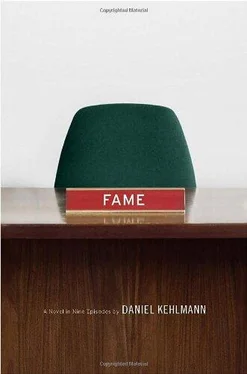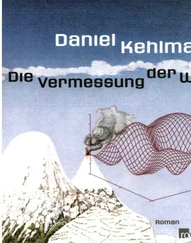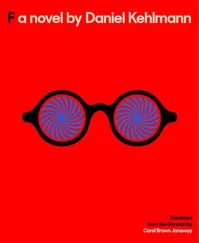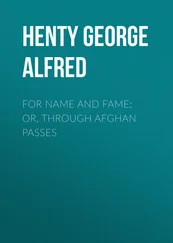And Rosalie? She goes down the street, taking great strides, half unconscious with euphoria, and for a moment I feel I’ve done the right thing, as if mercy were all-important and one story less didn’t matter. And at the same time, I have to confess, I have an absurd hope that someone someday will do the same for me. For like Rosalie I cannot imagine that I’m a nothing if I’m not being observed by somebody else, and that my only half-real existence ends the moment that that somebody takes his eyes off me—just as, now that I’m finally ending this story, Rosalie ceases to exist. From one moment to the next. Without any death throes, pain, or transition. At one instant an oddly dressed girl in a state of happy confusion, now a mere undulation in the air, a sound that echoes for a few seconds, a memory that bleaches itself from my mind and from yours as you read this paragraph.
What remains, if anything, is a street in the rain. Water pouring off two children’s ponchos, a dog over there lifting its leg, a yawning street sweeper, and three cars with unknown number plates rounding the corner as if they were coming from a long way away: out of another unknown reality or at least out of another story altogether.
In the early summer of his thirty-ninth year, Ralf Tanner the actor began to feel he didn’t exist.
From one day to the next, phone calls stopped. Friends of long standing vanished from his life, business plans collapsed for no good reason, a woman he’d loved insofar as he was capable maintained that he’d mocked her cruelly on the telephone, and another, Carla, suddenly surfaced in a hotel lobby to make the worst scene he’d ever undergone in his life: three times, she screamed, he’d stood her up three times in a row! People had stopped, grinning, to watch, a few of them had filmed it all on their cell phones, and already in the very moment Carla had hit him with all her strength, he knew that these few seconds would make it onto the Internet and eclipse the fame of his best films. Shortly after that, he was forced to part with his German shepherd because of allergies and in his distress he shut himself up to paint pictures that he didn’t dare let anyone see. He bought albums of photographs of the designs on the wings of Central Asian butterflies, and read books on how to dismantle and reassemble watches without ever daring to try it himself.
He began to google his own name several times a day, corrected the Wikipedia entry on himself that was riddled with errors, checked the casting in his films in various databanks, and laboriously translated the opinions of participants in forums about them from Spanish, Italian, and Dutch. Absolute strangers got into fights in these forums about whether he really had split definitively with his brother years before, and he, who had never been able to stand his brother, read their views as if there might be a chance he’d find in them the answer to his existential crisis.
On YouTube he found the tape of a performance by a pretty good Ralf Tanner impersonator: a man who was almost his double—with a voice and gestures to match. On the right of the screen, the system offered a list of links to other videos connected with his name: clips from his films, two interviews, and of course the scene with Carla in the hotel lobby.
That evening he went out with a woman he’d been chasing for a long time. But when he was sitting opposite her, he suddenly found it impossible to pretend that her chatter interested him. The glances from people at the other tables, their whispering, and the direct staring, all disturbed him more than usual. As they got up to leave the restaurant, a man came up to ask for an autograph with the usual mixture of shyness and insistence.
“I only look like him, that’s all,” said Ralf.
The man eyed him suspiciously.
“It’s my job. I do it onstage. I’m an impersonator!”
The man let them pass. The woman found his answer so funny, she was still laughing minutes later in the taxi.
That night, watching in the gray mirror as their two naked silhouettes merged, he wished himself with all his heart transported to the other side of its flat surface, and the next morning, as he listened to her breathing peacefully beside him he felt some stranger had wandered into the room by accident, and the stranger wasn’t her.
He had long suspected that the act of being photographed was wearing out his face. Was it possible that every time you were filmed, another person came into being, a less-than-perfect copy that ousted you from your own presence? It seemed to him that after years of being famous only a part of him survived, and all he needed to be whole again was to die, and to be alone in the place he truly belonged: in films and in his myriad photographs. That body, the one that still breathed, felt hungry, and wandered around for no good reason, would cease to be a burden to him—a body that in any case bore little resemblance to the film star. So much work and so much makeup, so much effort and remodeling went into making sure that he really looked like the Ralf Tanner on the screen.
He called Malzacher, his agent, canceled the trip to the Valparaiso Film Festival, then set off to a discotheque called Looppool on the outskirts of town, where, according to what he’d found on the Internet, there was going to be an appearance by famous actors’ doubles. He told his chauffeur to wait outside, and went in, feeling shyer than he had in years. Someone wanted an entrance fee, but, when he saw Ralf’s face, waved him on in.
It was hot and sticky, the light harsh and flickering. Over at the bar was a man who looked like Tom Cruise, Arnold Schwarzenegger was clearing a path through the crowd at the other end, and of course there was a Lady Diana in an outfit straight from a discount store. People turned as he went by, but their glances were brief and unfocused, slightly indifferent. Diana now climbed up onstage and sang “Happy Birthday, Mr. President”; there was obviously some mix-up, but the crowd roared its approval. A woman smiled at him. He looked back at her. She came toward him. His heart began to thump, he didn’t know what he should say. She was at his side and then they were on the dance floor, her body pressed close to his.
Shortly after that he found himself up onstage. People stared up at him as he did his famous dialogue with Anthony Hopkins from I’m the Man in the Moon. He did the Anthony part really well, but stumbled a bit in his own replies. The audience clapped and whooped, he jumped back down into the room, and the woman he’d been dancing with whispered in his ear that her name was Nora.
The owner of the discotheque tapped him on the shoulder and gave him fifty euros. “That was okay, though not terrific. Tanner talks differently, and he holds his hands sort of like this.” He demonstrated. “You look like him, but you haven’t got his body language yet. Watch more of his movies! Come back next week.”
As he and the woman stepped out onto the street, he panicked. He couldn’t take her home with him. The moment she saw the house and the servants, she’d know that he wasn’t who he claimed he was—or, rather, that he really was. He pretended not to see the waiting chauffeur, flagged down a taxi, invented something about a brother who was visiting right now; with a look that told him she didn’t believe a word and assumed he must be married, she said her apartment was in a mess.
It was in fact small and extremely tidy, and Ralf Tanner spent the last night of his life there. It wasn’t him but someone else who clasped Nora’s body with a strength he’d never possessed before. In the early dawn she stroked his neck and told him he was wonderful. Many women had said this to him before, but he knew none of them had meant it.
Читать дальше












